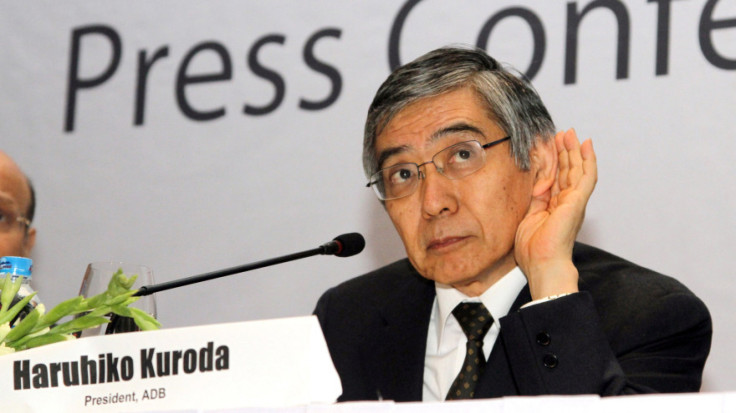Bank Of Japan Board Rift Over Economic Stimulus Plan Poses Big Challenge To Governor Kuroda

A rift among Bank of Japan board members on steering radical monetary stimulus measures to end two decades of deflation came to the fore Monday as the BOJ released minutes of its April 26 meeting.
The BOJ's policy meeting, held three weeks after its massive quantitative easing announcement on April 4, saw considerable debate among members over the bold measures.
The rift underlined the challenges facing Governor Haruhiko Kuroda in his attempts to steer the Japanese economy toward sustained growth. Some of the nine-member BOJ board expressed concerns over the volatility in the Japanese Government Bond market following the monetary easing measures adopted on April 4, the minutes revealed.
The members warned that overly aggressive bond purchasing could have unwanted side effects, including credit choking. They urged the central bank to take deliberate steps to offset the ramifications of its aggressive JGB purchases.
“Regarding the effects of JGB purchases on liquidity in the JGB and repo market, a few members ...expressed the opinion that it should continue to deliberate on measures to prevent a decline in liquidity,” the summary of discussions stated, as reported by MarketWatch.
A few members voiced their concern about the rise in borrowing costs that could undermine the radical stimulus policy.
"We're still seeing potential instability in the bond market," one member was quoted as saying in the minutes released Monday.
The BOJ had announced a huge stimulus last month, promising to inject $1.4 trillion in less than two years, to revive an economy mired in deflation for past 15 years. The bank had set a target of achieving 2 percent inflation in next two years. But in the April 24 meeting, it revised the deadline to achieve the inflation target in the second-half of a three-year period.
The minutes also exposed differences of opinion among board members over the inflation target.
"A few members said it was tough to achieve 2 percent inflation in the latter half of the forecast period as there is uncertainty over how changes in future inflation expectations will actually push up prices," the minutes stated.
One of the members called for more flexibility in guiding monetary policy and said the BOJ's credibility will be hurt if it fails to achieve the set target.
"Failure to meet the price target will test the BOJ's credibility. But the bank's policy itself is contradictory. When expectations of inflation heighten, bond yields will rise. The BOJ cannot really do anything to stop that," Yasuhide Yajima, chief economist with NLI Research Institute in Tokyo told Reuters.
The BOJ in its April 26 meeting pledged to double its JGB holdings in two years as it expands the supply of money from an annual pace of 60 trillion yen ($593 billion) to 70 trillion. The move was intended to force down bond yields, push down the borrowing costs and encourage spending and investment.
The massive stimulus sent stocks surging to multi-year highs, while the bond buying policy created volatility in the market. Although the yield on the benchmark 10-year JGBs hit an all-time low of 0.315 percent on April 5, it rebounded to its higher levels in the following days.
The yield on the 10-year JGBs reached 1 percent last week -- its highest level in a year -- casting doubts over the effectiveness of the BOJ’s easing policy.
Price volatility for JGBs increased by 2.6 percent this year to 3.69 percent as of May 21 based on a 60-day reading, the biggest advance among 26 sovereign-debt markets tracked by Bloomberg and the European Federation of Financial Analysts Societies, a Bloomberg report said.
The bond market jitters remain a cause of worry for the Japanese banks that are heavily loaded up on bonds. Reacting to the turbulence in the bond market, Kuroda said Sunday that BOJ will take steps, including pumping money via market operations, to stabilize the situation.
He said the volatility in the bond market is not affecting Japan’s economy yet and Japanese banks have sufficient buffers against losses that may be incurred from volatility in bond yields. However, the central bank, realizing the danger of losing investor confidence, has called for a meeting with JGB participants on Wednesday to boost investor confidence.
© Copyright IBTimes 2024. All rights reserved.












